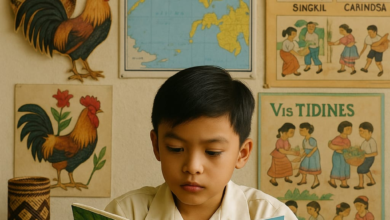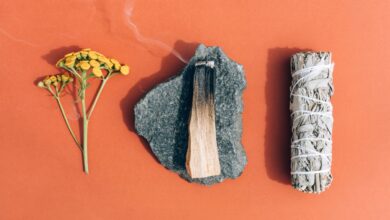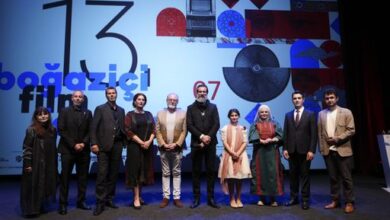Honoring American Indian and Alaska Native Heritage Month
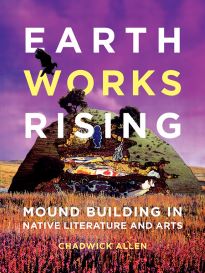
Article: “What Is at Stake for Washington’s Native Nations Today?” Pacific Northwest Quarterly 111.1 (Winter 2019/2020): 35-47
Edited and Annotated by UW Professors Jean Dennison (Osage Nation) and Joshua L. Reid (Snohomish) and local Native leaders Melvinjohn Ashue (Hoh) and Lisa Wilson (Lummi)
In October 2018, the Seattle Public Library hosted a roundtable titled “What is at stake for Washingon’s Native nations today (video – Seattle Channel). While the discussion covered a broad range of topics and issues four interrelated themes emerged: treaty rights, relationship building, environmental concerns and activism, and education. This article is a recap of the roundtable, edited for length and clarity.
Book: Earthworks Rising: Mound Building in Native Literature and Arts (University of Minnesota Press, 2022)
by Chadwick Allen, Professor, Department of English; Associate Vice Provost for Faculty Advancement; Russell F. Stark University Professor
Alongside twentieth- and twenty-first-century Native writers, artists, and intellectuals, Chadwick Allen examines the multiple ways Indigenous mounds continue to hold ancient knowledge and make new meaning—in the present and for the future. Clear and compelling, Earthworks Rising provokes greater understanding of the remarkable accomplishments of North America’s diverse mound-building cultures over thousands of years and brings attention to new earthworks rising in the twenty-first century.
Video: Katz Distinguished Lectures in the Humanities: Earthworks Rising
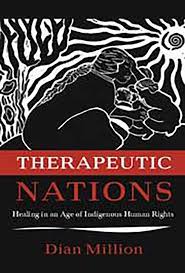
Book: Therapeutic Nations: Healing in an Age of Indigenous Human Rights (The University of Arizona Press, 2013)
by Dian Million (Tanana Athabascan), Associate Professor, American Indian Studies and an Affiliated faculty in Canadian Studies, the Comparative History of Ideas Department, and the English Department
Therapeutic Nations is the first book to demonstrate affect and trauma’s wide-ranging historical origins in an Indigenous setting, offering insights into community healing programs. The author’s theoretical sophistication and original research make the book relevant across a range of disciplines as it challenges key concepts of American Indian and Indigenous studies.
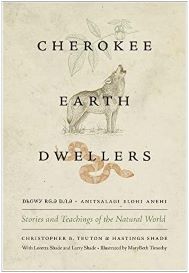
Book: Cherokee Earth Dwellers: Stories and Teachings of the Natural World (University of Washington Press, 2023)
by Christopher B. Teuton (Cherokee Nation), Professor and Chair of American Indian Studies and Hastings Shade, with Loretta Shade and Larry Shade, illustrated by MaryBeth Timothy
Ayetli gadogv—to “stand in the middle”—is at the heart of a Cherokee perspective of the natural world. From this stance, Cherokee Earth Dwellers offers a rich understanding of nature grounded in Cherokee creature names, oral traditional stories, and reflections of knowledge holders. During his lifetime, elder Hastings Shade created booklets with over six hundred Cherokee names for animals and plants. With this foundational collection at its center, and weaving together a chorus of voices, this book emerges from a deep and continuing collaboration between Christopher B. Teuton, Hastings Shade, Loretta Shade and others.
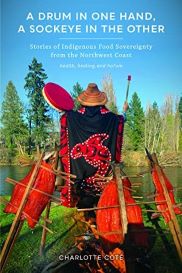
Book: A Drum in One Hand, a Sockeye in the Other, Stories of Indigenous Food Sovereignty from the Northwest Coast (University of Washington Press, 2022)
by Charlotte Coté (Tseshaht/Nuu-chah-nulth), Professor, American Indian Studies
Charlotte Coté shares contemporary Nuu-chah-nulth practices of traditional food revitalization in the context of broader efforts to re-Indigenize contemporary diets on the Northwest Coast. Coté offers evocative stories of her Tseshaht community’s and her own work to revitalize relationships to haʔum (traditional food) as a way to nurture health and wellness. As Indigenous peoples continue to face food insecurity due to ongoing inequality, environmental degradation, and the Westernization of traditional diets, Coté foregrounds healing and cultural sustenance via everyday enactments of food sovereignty: berry picking, salmon fishing, and building a community garden on reclaimed residential school grounds. This book is for everyone concerned about the major role food plays in physical, emotional and spiritual wellness.
Videos:
Article: What does it mean to ‘re-Indigenize’ contemporary diets? KUOW
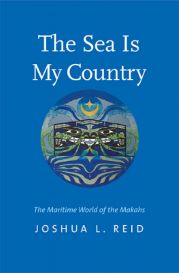
Book: The Sea is My Country: The Maritime World of the Makahs (Yale Books, 2015)
by Joshua Reid (Snohomish); Associate Professor, Department of History and American Indian Studies; Director, Center for the Study of the Pacific Northwest; John Calhoun Smith Memorial Endowed Professor
Joshua L. Reid discovers that the “People of the Cape” were far more involved in shaping the maritime economy of the Pacific Northwest than has been understood. He examines Makah attitudes toward borders and boundaries, their efforts to exercise control over their waters and resources as Europeans and then Americans arrived, and their embrace of modern opportunities and technology to maintain autonomy and resist assimilation. The author also addresses current environmental debates relating to the tribe’s customary whaling and fishing rights and illuminates the efforts of the Makahs to regain control over marine space, preserve their marine-oriented identity, and articulate a traditional future.
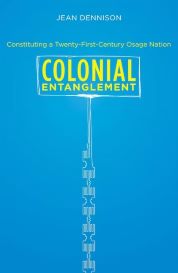
Book: Colonial Entanglement: Constituting a Twenty-First-Century Osage Nation (The University of North Carolina Press, 2012)
by Jean Dennison (Osage Nation), Associate Professor, American Indian Studies; Co-Director, Center for American Indian and Indigenous Studies
From 2004 to 2006 the Osage Nation conducted a contentious governmental reform process in which sharply differing visions arose over the new government’s goals, the Nation’s own history, and what it means to be Osage. The primary debates were focused on biology, culture, natural resources and sovereignty. Osage anthropologist Jean Dennison documents the reform process in order to reveal the lasting effects of colonialism and to illuminate the possibilities for indigenous sovereignty. In doing so, she brings to light the many complexities of defining indigenous citizenship and governance in the twenty-first century.
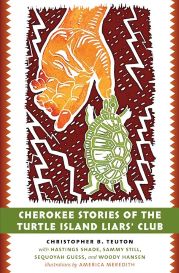
Book: Cherokee Stories of the Turtle Island Liars’ Club (The University of North Carolina Press, 2012)
by Christopher B. Teuton (Cherokee Nation), Professor and Chair of American Indian Studies
Cherokee Stories of the Turtle Island Liars’ Club paints a vivid, fascinating portrait of a community deeply grounded in tradition and dynamically engaged in the present. A collection of forty interwoven stories, conversations, and teachings about Western Cherokee life, beliefs, and the art of storytelling, the book orchestrates a multilayered conversation between a group of honored Cherokee elders, storytellers, and knowledge-keepers and the communities their stories touch. Collaborating with Hastings Shade, Sammy Still, Sequoyah Guess, and Woody Hansen, Cherokee scholar Christopher B. Teuton has assembled the first collection of traditional and contemporary Western Cherokee stories published in over forty years.
Article: “Prejudicial reactions to the removal of Native American mascots” SAGE journals (Winter 2021)
by Tyler Jimenez, UW Assistant Professor of Psychology, and Jamie Arndt, and Peter J. Helm of the University of Missouri
Research shows how discontinuing a Native American mascot can stoke racism among a team’s surrounding community.
Related article: Bias against Native Americans spikes when mascots are removed, UW News
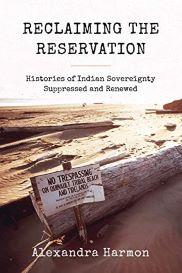
Book: Reclaiming the Reservation: Histories of Indian Sovereignty Suppressed and Renewed (University of Washington Press, 2019)
by Alexandra Harmon, Professor Emerita, American Indian Studies and History
In Reclaiming the Reservation, Alexandra Harmon delves into Quinault, Suquamish, and pan-tribal histories to illuminate the roots of Indians’ claim of regulatory power in their reserved homelands. She considers the promises and perils of relying on the US legal system to address the damage caused by colonial dispossession. She also shows how tribes have responded since 1978, seeking and often finding new ways to protect their interests and assert their sovereignty.
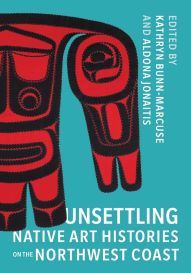
Book: Unsettling Native Art Histories on the Northwest Coast
Edited by Kathryn Bunn-Marcuse, Associate Professor, Art History; Bill Holm Center Endowed Professor; Curator of Northwest Native American Art, Burke Museum; Director, Bill Holm Center, Burke Museum and Aldona Jonaitis
By centering voices that uphold Indigenous priorities, integrating the expertise of Indigenous knowledge holders about their artistic heritage, and questioning current institutional practices, these new essays “unsettle” Northwest Coast art studies. Key themes include discussions of cultural heritage protections and Native sovereignty; re-centering women and their critical role in transmitting cultural knowledge; reflecting on decolonization work in museums; and examining how artworks function as living documents. The volume exemplifies respectful and relational engagement with Indigenous art and advocates for more accountable scholarship and practices.
Source link

